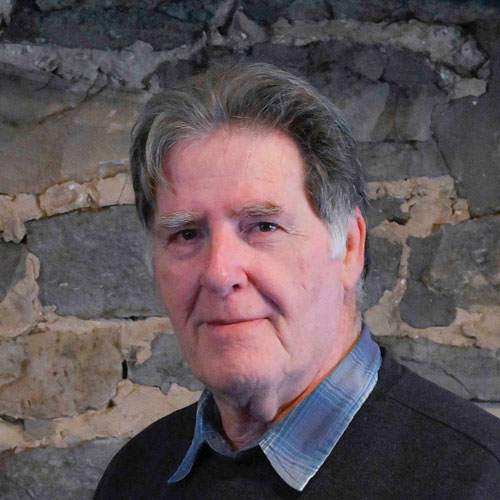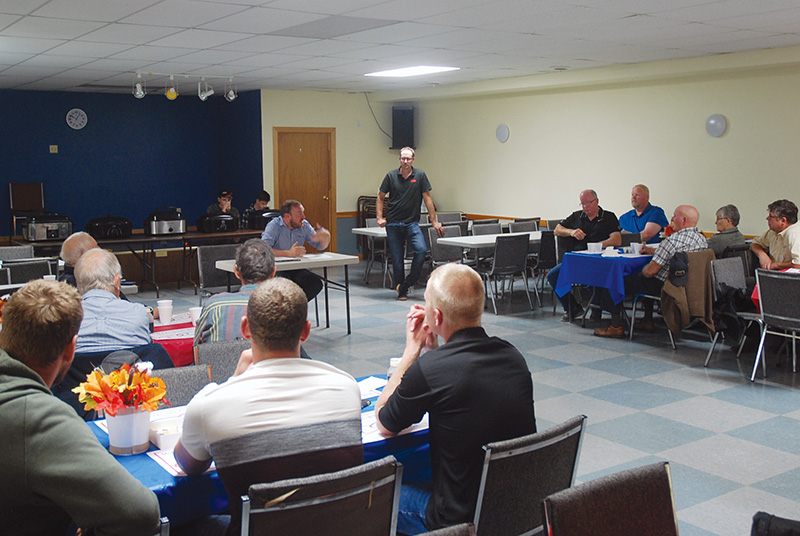Member of Parliament Eric Duncan (seated) answered questions from visitors at the Dundas Federation of Agriculture breakfast held on Sept. 17 in Williamsburg. The event was moderated by Ryan Devries (standing). Morin Photo
WILLIAMSBURG – The Dundas Federation of Agriculture hosted a casual breakfast event at the Williamsburg Oddfellows Hall in Williamsburg on Sept. 17.
The breakfast was an opportunity for members of the Dundas farming community to talk about the variety of challenges, concerns, and successes in agriculture in the area.
Around 30 people attended the breakfast.
MP Eric Duncan was on hand to answer questions about federal and provincial responses to current issues affecting the agricultural industry. Duncan’s provincial counterpart, MPP Nolan Quinn was unable to attend the breakfast.
The questions asked by attendees at the breakfast covered a wide range of subjects. Visitors asked MP Duncan about agricultural labour and educational issues, cell phone and internet access in rural Ontario, the federal government’s latest position on carbon emissions and what could be done about an aging rural infrastructure.
MP Duncan touched on these and many more issues, bringing people up to date about how the different levels of government were navigating their different challenges.
Duncan said he would take notes from the breakfast and pass along to MMP Quinn so that he could also be aware of the issues discussed at the breakfast.
MP Duncan notes that the federal government had confused the farming community with its lack of details regarding the recent announcement of wanting to reduce carbon emissions 30 per cent by 2030 but had not been very clear how farmers were expected to achieve that goal.
“The agricultural community has pushed back on exactly what that would mean.”
MP Duncan talked about the problem caused for farmers after the federal government imposed a tariff on Russian nitrogen fertilizer products.
“On the fertilizer tariffs I will just say this: From the public policy end, I do not understand for the life of me why they are doing this, and why they have not changed course on that. When it comes to things that were ordered before Mar. 2 from Russia. It does not make any sense,” he said.
His logic is that fertilizer orders from Russia that were already paid for should not have a tariff placed on them. “There is no penalty for Russia,” said Duncan.
He felt anything ordered after that date should certainly have the tariff applied. “We have to turn revenue off for them,” he said.
The problem according to Duncan is that farmers will also be paying a price because of the international situation with Russia. He felt a farmer’s input costs are already dangerously high.
He said, inflationary costs are already at a significant level, and he would continue to urge the government to find a solution to the tariff challenge.
The MP was referring to the federal government’s decision to place a tariff on Russian fertilizer products. Many argue that while a tariff may be politically necessary to let Russia know just where Canada stands regarding Russia’s invasion of Ukraine, the tariff should not apply to products ordered before the March announcement about the tariff.
This past March, Canada issued a 35 per cent tariff on Russian imports including nitrogen fertilizer. Area farmers routinely use these nitrogen-based fertilizers to help maintain a healthy crop production yield. Farmers place orders for what they need months in advance, and many feel the tariff should not apply to products from Russia that were ordered prior to the tariff announcement. The political decision has had a huge impact on Eastern Ontario farmers. Each year, Russia traditionally supplies Eastern Canada with around 660,000 tonnes of nitrogen fertilizer. It has been estimated that their exports represent around 85 to 90 per cent of all fertilizers used on Eastern Canada fields each year.
Duncan gave credit to the various farm groups who have been following the fertilizer issue.
He mentioned that the issue of reducing the agriculture carbon footprint was a difficult one to resolve.
“We already have some of the best environmental practices to begin with around the world.”
He explained the reasoning behind the reduction of Canadian carbon emissions was along the same line as the reduction of oil and gas use. When Canadian producers reduce their production, which they have achieved under intense Canadian environmental regulations, other countries that do not have good environmental or human rights’ regulations just increase their production and sell more to make up for what Canada is not producing.
Duncan stressed that raising awareness about the challenges farmers face is one way of letting the government of the day know where farmers stand. And consequently, could affect government policy in a good way.
The MP had an interesting and thoughtful reply to questions about internet and cell phone coverage in Eastern Ontario. He suggested that part of the problem was that the various new technologies that are available now have not been able to keep up with the demand they have created, as opposed to the industry not having an interest in bringing better access to the area.
Some questions touched on the state of the area’s infrastructure including the future cost of maintaining good bridges, culverts, and roads.
Some infrastructure funding comes from the revenue collected at the gas pump and distributed to municipalities, but municipalities have been asking all levels of government to help with additional funds.
In 2021, the Gas Tax Fund was renamed the Canada Community-Building Fund (CCBF).
The CCBF is a permanent source of funding to provinces and territories, which in turn flow this funding to their municipalities to support local infrastructure priorities.
The Canada Community-Building Fund delivers over $2 billion every year to 3,600 communities across the country.
Duncan said the problem is that there are more rural roads than the population of taxpayers, needed to pay for them. He cited inflation as one of the reasons why it was getting more expensive for municipalities to upgrade and maintain their infrastructure.
“In construction, that rate is around a 30 to 40 per cent increase.”
He agreed that in the years to come, municipalities would face a challenge of trying not to fall behind.

Joseph Morin is the Editor of the Eastern Ontario AgriNews, and the Record. He is, despite years of practice, determined to eventually play the guitar properly. He has served the Eastern Ontario community as a news editor, and journalist for the past 25 years with the Iroquois Chieftain, Kemptville Advance, West Carleton Review, and Ottawa Carleton Review in Manotick. He has never met a book he did not like.









